News
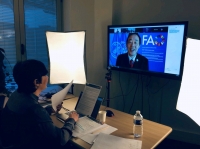
24/03/2021
In his keynote address at the 2021 Global Food Safety Initiative Conference, FAO Director-General QU Dongyu emphasized the urgent need for agri-food system transformation to end hunger and malnutrition and feed everyone on the planet safe and nutritious food. He highlighted several ways to move towards efficient and sustainable agri-food systems.
This year, the three-day conference is being held virtually and centres on a theme of ‘Food Safety: Rethink, Reset, Recharge’. The annual international conference draws more than 1 200 food industry leaders from more than 50 countries to ‘share knowledge, showcase their learnings and do business’.
The photo above, courtesy of...
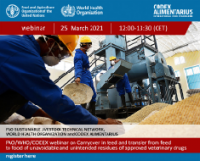
19/03/2021
Manufacturers of feed and feed ingredients, livestock farmers, animal source food producers, distributors and salers need to collaborate to identify and manage potential health threats. Collaboration between these entities enables the development and application of appropriate risk management strategies for safe production and use of medicated animal feed. FAO and WHO convened an expert meeting to review the causes of veterinary drug carryover in animal feed and transfer to food, the known risks of such carryover to human health and international trade and suggest appropriate risk management strategies. The report of this expert meeting will be forwarded to Codex Committee on Residues of Veterinary Drugs...

16/03/2021
Foodborne parasitic diseases do not always receive priorities in national food control systems. Although they can cause both acute and chronic health problems, limited detection and surveillance capacities and extreme under-reporting by those afflicted make the problems invisible to the authorities and the public.
In March 2021, FAO Regional Office for Asia and the Pacific published a booklet entitled “Parasites in foods - an invisible threat”. This concise resource explains the reality of the negative impacts of parasites in food, and provides recommendations for the food safety competent authorities with practical actions to mitigate and manage these neglected diseases.
Parasitic...
.jpg)
15/03/2021
Dietary data reveal important information about food safety as well as nutrition. FAO and WHO are working together to make information available about what people eat and drink reportedly so that governments can estimate dietary exposure to chemical and biological hazards and nutrient intake. The FAO/WHO Global Individual Food Consumption Data Tool (GIFT) collates and shares individual food consumption data that comes from national and sub-national surveys conducted in different parts of the world. The FAO/WHO GIFT is an open access repository of quantitative sex-and-age disaggregated data, which contribute to the assessment of food safety...
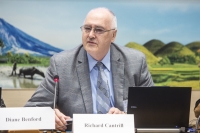
10/03/2021
Richard Cantrill is a food safety and quality consultant with expertise in edible fats and oils and is based in Halifax, Nova Scotia, Canada. He was formerly the Chief Scientific Officer and Technical Director of the American Oil Chemists’ Society. Dr Cantrill was vice-chairperson for the 89th and 90th sessions of the Joint FAO/WHO Expert Committee on Food Additives (JECFA) and chairperson for the 91st, which concluded on 25 February 2021, when the meeting report was adopted.
The meeting chaired by Cantrill evaluated cadmium and ergot alkaloids, and discussed the acceptability of certain substances as previous cargoes as well as the...

23/02/2021
Within Maasai pastoralist communities, milk provides a rich source of nutrients and income, especially for women, and plays a central role in cultural and religious ceremonies. Having milk means having livestock, and having livestock means the continuation of the Maasai people. While a vital nutritional and cultural resource, milk is also a potential food safety risk as well as a vehicle for the transmission of antimicrobial resistance (AMR).
This risk occurs as some Maasai do not boil their milk or observe withdrawal - the period of time necessary for antimicrobial residues to degrade - after administering drugs to their livestock. By...
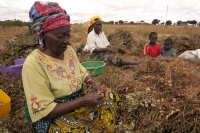
22/02/2021
The government of Malawi has signed a new Technical Cooperation Project (TCP) with FAO to strengthen the national food control system in Malawi that will run until the end of 2022. The TCP builds on the results of a participatory assessment of the national food control system (NFCS) that was implemented in Malawi in 2017-2018, using the FAO/WHO food control system assessment tool.
Malawi is a country whose economy is largely agro-based with agriculture contributing to about 42 percent of the national gross domestic product (GDP) and 81 percent of export earnings (source: MoAIWD, 2018). The national agricultural and...
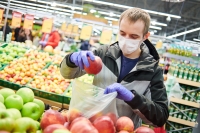
14/02/2021
Watch as this year’s World Food Safety Day theme and visual identity are unveiled in an online event on 18 February 2021. A newscast-style video will shine a spotlight on food safety efforts – at government level, within food and agriculture production and in particular in communicating with the public and sharing food safety-related information.
The line-up includes stories from FAO, WHO and the secretariats of the Codex Alimentarius Commission and International Food Safety Authorities Network.
Tune in on:
Date: 18 February 2021 Time: 15:00 CET (UTC+1) Platform: https://twitter.com/FAOWHOCodex (no Twitter account needed to watch the video)
In case you...

27/01/2021
A virtual meeting of the Joint FAO/WHO Expert Meetings on Microbiological Risk Assessment (JEMRA) of Listeria monocytogenes in Ready-To-Eat (RTE) Food: Attribution, Characterization and Monitoring was held from 20 October to 6 November 2020. The purpose of the meeting was to review recent data on Listeria monocytogenes and determine the need to modify, update or develop new risk assessment models and tools for this pathogen.
Prior to the meeting, a public call for data and experts was issued. In addition, background documents were prepared ahead of time for consultation by the experts. The documents included:
A review of two...

15/01/2021
Two FAO and WHO directors briefed the Executive Committee of the Codex Alimentarius Commission (CCEXEC) yesterday on the UN Food Systems Summit, which UN Secretary-General António Guterres will convene later in 2021 to set about bold new actions that transform the way the world produces and consumes food. Jamie Morrison, FAO Director of the Food Systems and Food Safety Division and Lead on Knowledge and Policy for the Food Systems Summit Secretariat, and Francesco Branca, WHO Director of Nutrition and Food Safety, emphasized the important role food safety and Codex standards will have in the transformation process, and can benefit food...
Stay up to date and connect to our RSS feed!
